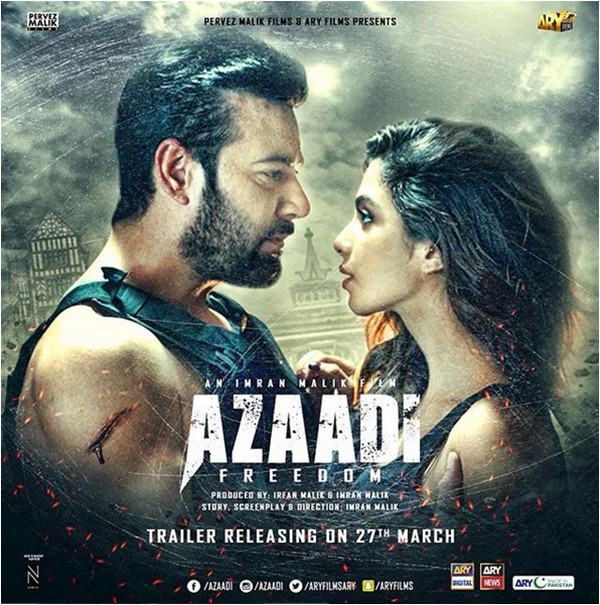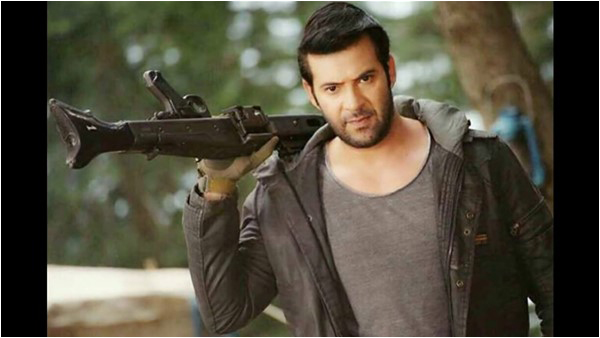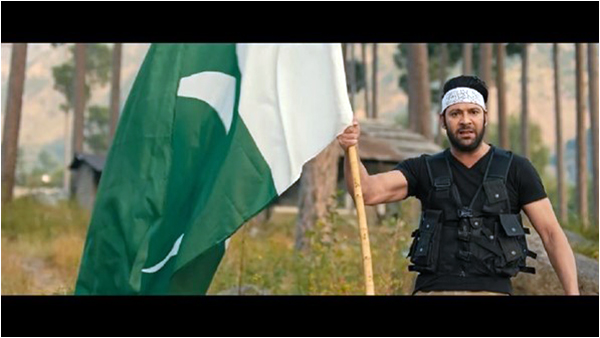
Jingoism has sold like anything in our neck of the woods. It still does. Indo-Pak filmmakers have often taken inspiration from Cold War cinema to produce films jam-packed with hyper-nationalism targeting one another, with the entertainment for the local viewers coming at the expense of the other people.
It’s cheap and it pays off. Waar and Yalghaar are epitomes of India-hating and money-making. And with the standoff in Kashmir intensifying, hate-laden opportunism was inevitable once again.
Unlike the man himself, an entire generation of Moammar Rana fans has grown old. If you think Rana, 44, opposite Sonya Hussain, 26, is weird, also give a thought to pay gaps especially in Lollywood and Bollywood.

Azaadi makers Irfan and Imran Malik have ostensibly tried to reenact the Burhan Wani incident, by portraying the ‘martyrdom of a freedom fighter’ in Indian-administered Kashmir during an encounter with the security forces on July 8, 2016. Only that Azaad, played by Rana, over-simplistically does manage to achieve freedom.
The story revolves around the dream of Azaad’s father (Nadeem Baig) who envisions a free Kashmir and his son goes on a quest to avhieve exactly that with the use of heavy artillery, the source of which of course hasn’t been mentioned. The budget spent on action scenes reflects in the regular explosions on the screens.
Meanwhile, Azaad’s love interest Zara (Sonya) isa journalist who goes to find him and cover his story. She realises too late that he is a mujahid now and has dedicated his life for a greater purpose.

There is absolutely no problem in making a movie on the Kashmiri struggle, or even overlooking the Kashmiri perspective and peddling the Pakistani position – how else will you get the film released here? The problem is in depicting even the skewed narrative with such absurdities that it ends up insulting the very cause that it aspires to take up.
In a country that is still reeling from the aftershocks of radical religionism, Azaadi is nothing but glorification of armed religious fundamentalism. Examples of the propaganda are reflected in the following dialogues: “Woh terrorist nahi hai, mujahid hai woh (he’s not a terrorist, but a mujahid)” and “Kayi saalon tak ye zindagi tumhari yaad ke hawalay kiye rakhi, ab yeh zindagi jihad ke hawale kar raha hun (for many years, I dedicated my life to you, now I’m dedicating it to jihad)”.
While India, too, has a jingoistic legacy spearheaded by the likes of JP Dutta, Bollywood has taken a turn for the better in recent years. In Raazi, for instance, even though director Meghna Gulzar kept her end safe, Pakistanis were shown as humans as well. However, Azaadi depicts outright anti-Hindu bigotry.
Rana does his best jihadi act and doubles up as a romantic hero as well – explaining a lot of what is wrong with the film. Sonya and Baig did whatever little was asked of them – the latter, of course, a veteran completely wasted in the shambolic script.
Sahir Ali Bagga’s music does tickle your fancy, but perhaps the film’s greatest high is Ben Jasper’s action-filled cinematography. Jasper is a known name in the Indian film industry for his contribution in movies like Bang Bang (2014).

The film’s aim to pass on the significance of the Kashmiri plight and struggle from one generation to another is admirable, but the atrocities in the held valley could have been depicted in a significantly better manner.
Bollywood’s Haider, is a classic example, all the more appreciable for being a Bollywood film. Despite not entirely being based on Kashmir, Haider backed the freedom cause between the lines.
Films like Azaadi will only harm Kashmiri cause, through the sheer volume of unadulterated jingoism that they propound. That the hyper-nationalism and jihadism is designed to attract the narrowest sections of the society shows that radicalism is being sold, and a human rights cause damaged, for immediate monetary interests.
It’s cheap and it pays off. Waar and Yalghaar are epitomes of India-hating and money-making. And with the standoff in Kashmir intensifying, hate-laden opportunism was inevitable once again.
Unlike the man himself, an entire generation of Moammar Rana fans has grown old. If you think Rana, 44, opposite Sonya Hussain, 26, is weird, also give a thought to pay gaps especially in Lollywood and Bollywood.

Azaadi makers Irfan and Imran Malik have ostensibly tried to reenact the Burhan Wani incident, by portraying the ‘martyrdom of a freedom fighter’ in Indian-administered Kashmir during an encounter with the security forces on July 8, 2016. Only that Azaad, played by Rana, over-simplistically does manage to achieve freedom.
The story revolves around the dream of Azaad’s father (Nadeem Baig) who envisions a free Kashmir and his son goes on a quest to avhieve exactly that with the use of heavy artillery, the source of which of course hasn’t been mentioned. The budget spent on action scenes reflects in the regular explosions on the screens.
Meanwhile, Azaad’s love interest Zara (Sonya) isa journalist who goes to find him and cover his story. She realises too late that he is a mujahid now and has dedicated his life for a greater purpose.

There is absolutely no problem in making a movie on the Kashmiri struggle, or even overlooking the Kashmiri perspective and peddling the Pakistani position – how else will you get the film released here? The problem is in depicting even the skewed narrative with such absurdities that it ends up insulting the very cause that it aspires to take up.
In a country that is still reeling from the aftershocks of radical religionism, Azaadi is nothing but glorification of armed religious fundamentalism. Examples of the propaganda are reflected in the following dialogues: “Woh terrorist nahi hai, mujahid hai woh (he’s not a terrorist, but a mujahid)” and “Kayi saalon tak ye zindagi tumhari yaad ke hawalay kiye rakhi, ab yeh zindagi jihad ke hawale kar raha hun (for many years, I dedicated my life to you, now I’m dedicating it to jihad)”.
While India, too, has a jingoistic legacy spearheaded by the likes of JP Dutta, Bollywood has taken a turn for the better in recent years. In Raazi, for instance, even though director Meghna Gulzar kept her end safe, Pakistanis were shown as humans as well. However, Azaadi depicts outright anti-Hindu bigotry.
The problem is in depicting even the skewed narrative with such absurdities that it ends up insulting the very cause
Rana does his best jihadi act and doubles up as a romantic hero as well – explaining a lot of what is wrong with the film. Sonya and Baig did whatever little was asked of them – the latter, of course, a veteran completely wasted in the shambolic script.
Sahir Ali Bagga’s music does tickle your fancy, but perhaps the film’s greatest high is Ben Jasper’s action-filled cinematography. Jasper is a known name in the Indian film industry for his contribution in movies like Bang Bang (2014).

The film’s aim to pass on the significance of the Kashmiri plight and struggle from one generation to another is admirable, but the atrocities in the held valley could have been depicted in a significantly better manner.
Bollywood’s Haider, is a classic example, all the more appreciable for being a Bollywood film. Despite not entirely being based on Kashmir, Haider backed the freedom cause between the lines.
Films like Azaadi will only harm Kashmiri cause, through the sheer volume of unadulterated jingoism that they propound. That the hyper-nationalism and jihadism is designed to attract the narrowest sections of the society shows that radicalism is being sold, and a human rights cause damaged, for immediate monetary interests.

